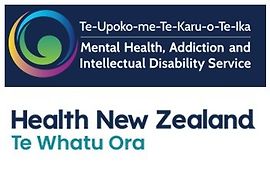Wellington > Mental Health & Addictions >
Te Korowai Whāriki - Regional Rehabilitation and Extended Care Inpatient Service | MHAIDS
Mental Health Service
Description
Forensic and Inpatient Rehabilitation Services for the central region from Gisborne to Wanganui and down to Wellington.
Te Korowai Whāriki is a regional and national service provider.
Te Korowai Whāriki also provides the Central Regional Forensic Community Mental Health Service, Central Regional Forensic Adult Inpatient Mental Health Service and Nga Taiohi National Secure Youth Forensic Inpatient Mental Health Service.
Our Forensic and Inpatient Rehabilitation Services supports Māori clients in strengthening their cultural identify to support their recovery and wellbeing. Vaka Pasifika is the base for Te Korowai Whāriki specialist Health Pasifika team, and complements Ruaumoko.
Staff
Staff members wear identification badges and you can ask them about their roles.
Fees and Charges Categorisation
Free
Fees and Charges Description
To find out if you are eligible for healthcare funding, please see the Mental Health, Addictions and Intellectual Disability Service website.
Hours
Visiting hours are between 10am and 8pm every day, outside of programme and meal times and by arrangement with staff.
Over the holiday period, visiting hours are by arrangement with the nurse in charge.
Visits by family or friends are encouraged as maintaining social contacts plays a positive role in a person’s recovery. Certain areas of the units may have greater restrictions than others; if necessary please discuss this with staff.
Languages Spoken
English
Programmes
Tāwhirimātea is a specialised inpatient unit that focuses on recovery and extended rehabilitation for up to 29 people who need a higher level of support within a closed environment. Each person admitted to an inpatient unit has a key worker (usually a nurse) and an associate key worker assigned to them. The key worker is responsible for coordinating the person’s care with the care team. They are usually also assessed by the medical staff on the day of admission, and later, as the need is identified, by other members of the multidisciplinary team. Usually, at least 2 meetings are held with the family of people admitted to the inpatient unit; the first within the first fortnight for a progress report and the final meeting to clarify discharge planning.
Tāwhirimātea is a specialised inpatient unit that focuses on recovery and extended rehabilitation for up to 29 people who need a higher level of support within a closed environment. Each person admitted to an inpatient unit has a key worker (usually a nurse) and an associate key worker assigned to them. The key worker is responsible for coordinating the person’s care with the care team. They are usually also assessed by the medical staff on the day of admission, and later, as the need is identified, by other members of the multidisciplinary team. Usually, at least 2 meetings are held with the family of people admitted to the inpatient unit; the first within the first fortnight for a progress report and the final meeting to clarify discharge planning.
- Programme Areas
Mental health
- Programme Type
Forensic
- Regions
MidCentral, Tairāwhiti, Hawke's Bay, Wellington, Nelson Marlborough, Hutt, Whanganui, Wairarapa
- Age Groups
Adult / Pakeke
- Referral Types
DHB clinical services, Corrections
Referral Process
We receive referrals from forensic inpatient units in the central region of New Zealand and from the following DHBs’ mental health services: Wairarapa, Hutt Valley, Capital & Coast, Hawke’s Bay, Midcentral, Nelson Malborough and Tairāwhiti.
Description
Tāwhirimātea is a specialised inpatient unit that focuses on recovery and extended rehabilitation for up to 29 people who need a higher level of support within a closed environment.
Each person admitted to an inpatient unit has a key worker (usually a nurse) and an associate key worker assigned to them. The key worker is responsible for coordinating the person’s care with the care team. They are usually also assessed by the medical staff on the day of admission, and later, as the need is identified, by other members of the multidisciplinary team.
Usually, at least 2 meetings are held with the family of people admitted to the inpatient unit; the first within the first fortnight for a progress report and the final meeting to clarify discharge planning.
Tāne Mahuta specialises in intensive rehabilitation in an open 14-bed inpatient setting and eight self-contained cottages adjacent to the main building. The cottages range from single to 5-bed accommodation; they provide an environment focused on supporting individual independence and give people the opportunity to experience a flatting situation. Each person admitted to an inpatient unit has a key worker (usually a nurse) and an associate key worker assigned to them. The key worker is responsible for coordinating the person’s care with the care team. They are usually also assessed by the medical staff on the day of admission, and later, as the need is identified, by other members of the multidisciplinary team. Usually, at least 2 meetings are held with the family of people admitted to the inpatient unit; the first within the first fortnight for a progress report and the final meeting to clarify discharge planning.
Tāne Mahuta specialises in intensive rehabilitation in an open 14-bed inpatient setting and eight self-contained cottages adjacent to the main building. The cottages range from single to 5-bed accommodation; they provide an environment focused on supporting individual independence and give people the opportunity to experience a flatting situation. Each person admitted to an inpatient unit has a key worker (usually a nurse) and an associate key worker assigned to them. The key worker is responsible for coordinating the person’s care with the care team. They are usually also assessed by the medical staff on the day of admission, and later, as the need is identified, by other members of the multidisciplinary team. Usually, at least 2 meetings are held with the family of people admitted to the inpatient unit; the first within the first fortnight for a progress report and the final meeting to clarify discharge planning.
- Programme Areas
Mental health
- Programme Type
Forensic
- Regions
MidCentral, Tairāwhiti, Hawke's Bay, Wellington, Nelson Marlborough, Hutt, Wairarapa
- Age Groups
Adult / Pakeke
- Referral Types
DHB clinical services
Referral Process
We receive referrals from forensic inpatient units in the central region of New Zealand and from the following DHBs’ mental health services: Wairarapa, Hutt Valley, Capital & Coast, Hawke’s Bay, Midcentral, Nelson Malborough and Tairāwhiti.
Description
Tāne Mahuta specialises in intensive rehabilitation in an open 14-bed inpatient setting and eight self-contained cottages adjacent to the main building. The cottages range from single to 5-bed accommodation; they provide an environment focused on supporting individual independence and give people the opportunity to experience a flatting situation.
Each person admitted to an inpatient unit has a key worker (usually a nurse) and an associate key worker assigned to them. The key worker is responsible for coordinating the person’s care with the care team. They are usually also assessed by the medical staff on the day of admission, and later, as the need is identified, by other members of the multidisciplinary team.
Usually, at least 2 meetings are held with the family of people admitted to the inpatient unit; the first within the first fortnight for a progress report and the final meeting to clarify discharge planning.
Additional Details
Face to face / Kanohi ki te Kanohi
Website
Contact Details
Rātonga-Rua-O-Porirua Mental Health Campus
Wellington
Website
-
Tāwhirimātea
(04) 918 2500
-
Tāne Mahuta
(04) 918 2425
Upper Main Drive
Porirua 5022
Street Address
Upper Main Drive
Porirua 5022
Was this page helpful?
This page was last updated at 12:24PM on August 19, 2024. This information is reviewed and edited by Te Korowai Whāriki - Regional Rehabilitation and Extended Care Inpatient Service | MHAIDS.

